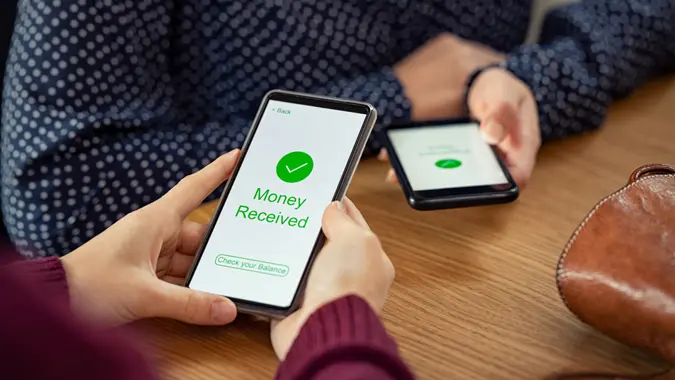This Executive Lost Her Life Savings to a Real Estate Scam: 7 Key Ways To Keep Your Money Safe

Commitment to Our Readers
GOBankingRates' editorial team is committed to bringing you unbiased reviews and information. We use data-driven methodologies to evaluate financial products and services - our reviews and ratings are not influenced by advertisers. You can read more about our editorial guidelines and our products and services review methodology.

20 Years
Helping You Live Richer

Reviewed
by Experts

Trusted by
Millions of Readers
When Rana Robillard found her dream home in Orinda, California, she was excited to learn she successfully outbid three other buyers. “So when Robillard […] received an email in late January from her mortgage broker with directions to wire a $398, 359.58 downpayment to a JPMorganChase account, she wasted no time sending the money,” wrote Hugh Son at CNBC.
Yet, while the email came from the broker’s address and looked identical to the ones she’d previously exchanged with him, the email was not sent by the broker at all. Instead, it came from a hacker–a startling realization Robillard made after receiving “what looked like a second duplicate request for a downpayment” the next day.
“It’s called Business Email Compromise,” stated Maria-Kristina Hayden, CEO & Founder at OUTFOXM. “This is one of the most lucrative types of attacks circulating these days because it preys on peoples’ complacency around emails. We have become so accustomed to sending and receiving sensitive information and instructions through email, and criminals are exploiting this information.”
So what can you do to avoid this type of scam? GoBankingRates spoke with cybersecurity experts to learn seven ways to save your money and keep it safe.
Call and Verify
“Before wiring any amount of money, call and verify the banking information you have through the phone number you have been using to communicate through,” stated Chris Henderson, Senior Director of Threat Operations at Huntress.
Do not, however, call the number on the wiring instructions as this could direct you to the very people trying to rob you. Henderson emphasized that, in general, you should err on the side of caution and assume digitally delivered instructions are always fake. Further, never click on any links sent to you.
Secure Portals
When sharing sensitive information, Carl Herberger, CEO at Coreo Network Security, suggested you forego email correspondence in place of secure portals. This way, information is encrypted and more difficult to intercept. Similarly, stay away from public Wi-Fi networks when utilizing online banking; opt for VPNs instead.
Multi-Factor Authentication
Herberger suggested implementing multi-factor authentication “for all accounts involved in the transaction.” Because it’s possible anyone could get a hold of your username and password, a second form of authentication like a thumbprint or one-time PIN can help ensure you are who you say you are.
Beware of Last-Minute Changes
Shawn Waldman, CEO/Founder at Secure Cyber, shared the biggest red flag to identify a scam: the buyer receives last-minute changes to the transaction details. Because cybercriminals take advantage of the urgency and high-value nature of transactions like home-buying, buyers can take the bait when they are in heightened and vulnerable states.
So if any routing or banking information changes on the fly, step away.
Inquire
“With the rise of AI, it’s become alarmingly easy for scammers to mimic brokers, replicate emails and use the same tone and structure in their communications,” stated Karen Zilberstein, VP of Product at Guardio. This is why buyers must stay vigilant when asking banks and other parties which advanced protections and security tools (like Guardio) are in place to secure large transactions.
If protections are sparse or seem subpar, proceed at your own risk.
Trust Your Instincts
Your gut is rarely wrong, and you should trust what it tells you. “If something feels off, it probably is,” stated Ian Paterson, CEO/Founder at Plurilock Security.
Make sure you pause and assess before taking action, especially if something seems off. Wire transfers are irreversible.
Go Old School
This is probably the most fool-proof. To ensure the utmost security, simply avoid online transactions altogether. Instead, stated Joe Warnimont, Security and Technical Expert at HostingAdvice, “go it the old-fashioned way: insist on paying with a check, then walk or drive it over to the bank or title company.”
Next Steps
So what should you do if you wind up the unfortunate victim of a cyber scam? Jon Clay, VP of Threat Intelligence at Trend Micro, emphasized the importance of immediate action. In other words, as soon as you suspect a crime may have taken place, contact both your bank and the receiving bank to see if it’s still possible to freeze the transaction.
If the funds have already cleared, bad actors will quickly move the funds through several banks to make them harder to track. This is why time is of the essence. Next, report the incident to the FBI’s Internet Crime Complaint (IC3) and local law enforcement. “Persistence in following up with banks and authorities can sometimes lead to the recovery of funds, though the process may be long and frustrating,” stated Clay.
 Written by
Written by  Edited by
Edited by 




























